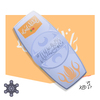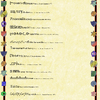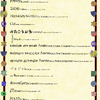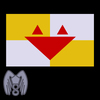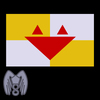Most Recent Submissions
Art
Audio
Literature
If anyone viewing this group desires, I will gladly translate any journal entry into any language requested of me. I am acquainted with Spanish, but I welcome any request to translate any part of this group into another language to accommodate any user who would like to view or participate in this group.
Artistic Language Spotlight: Utopian
Posted On: 23 Dec 2024, 06:01 PM
Posted By: fragmented_imagination
Description
Utopian is the language of the fictional land of Utopia. It was described in Sir Thomas More’s socio-political satire novel Utopia (rendered under the original Latin title Libellus vere aureus, nec minus salutaris quam Festivus, de optimo rei publicae statu deque nova insula Utopia, which translates to “A truly golden little book, no less beneficial than entertaining, of a republic’s best state and of the new island Utopia” … you know… just to let you know it’s a satire). The work was written in Latin and published in Habsburg Netherlands in 1516 (first printed in English in 1551). The name of the land “Utopia” comes from a Greek calque of the Latin “Nusquama”, the working name More used for the land which derives form the Latin word for “nowhere”.
More’s Utopia poked fun of the abstract nature of Plato’s Republic and serves as commentary of the poor state of England by describing the niceties of the titular Utopia in a conversation with others, among which is a Portuguese mariner Raphael Hythlodaeus who claims to have been to Utopia. Utopia itself is supposed to be part of the New World (America), but, due to someone coughing, no one ever heard the exact latitude and longitude where Utopia sits. Its language was described by Hythlodaeus to More. Given the involvement of More’s friend Peter Giles in the writing of the addendum in which the language actually appears, there is no way to tell who actually created the language (it is speculated that Giles was at least responsible for the alphabet, but neither credits the other anywhere).
Features
The language is written with a 22-letter alphabet based on the 23-letter Roman alphabet current to the 16th century (the “z” is missing). The letters are based around circles and squares mostly with differing shapes representing different letters. Like Latin, it is a left-to-right, horizontal writing system with spaces between words. Because neither More nor Giles created a pronunciation guide, it is likely that the language was meant to have a pronunciation similar to Greek or Latin.
Its grammar appears to be similar to Greek and Latin, featuring at least three noun cases and some vague hints at verb inflection. Its sentence structure appears to be Subject-Verb-Object, much like the contemporary form of Latin. The language avoids being a complete argot by at least showing a couple word forms that do not have similar corresponding features in the Latin translation.
Corpus
Utopian was only ever featured in the addendum to Utopia. Its only known written work consists of the key and a quatrain on the same page. And, strangely enough, there is at least one spelling error, as the first word “Vtopos”, in the Utopian script, is rendered “Stoqos”. Because of this one sample, Utopian does not have much of a vocabulary to reference.
Example
(the quatrain from Utopia)
Vtopos ha Boccas peula chama polta chamaan Bargol he maglomi baccan soma gymnosophaon Agrama gymnosophon labarem bacha bodamilomin Voluala barchin heman la lauoluola dramme pagloni.
Translated to English:
“The commander Utopus made me into an island out of a non-island. “I alone of all nations, without philosophy, “have portrayed for mortals the philosophical city. “Freely I impart my benefits; not unwillingly I accept whatever is better.”
...
Libellus vere aureus, nec minus salutaris quam Festivus, de optimo rei publicae statu deque nova insula Utopia is in the Public Domain.
Citations
Manuel, Frank E., and Fritzie P. Manuel. Utopian Thought in the Western World. The Belknap Press of Harvard University Press, 1979. https://archive.org/details/UtopianThoughtInTheWesternWorld/page/n1/mode/2up
More, Thomas. Libellus vere aureus, nec minus salutaris quam Festivus, de optimo rei publicae statu deque nova insula Utopia. Self, Robinson, Ralph; Burnet, Gilbert; Holbein, Ambrosius, 1518 Edition, More, 1516.https://www.gutenberg.org/ebooks/2130
Theodulus Odovacar. “Utopian language.” Fiction Encyclopedia, Version 2 October 2011, www.fandom.com, 30 September 2007, Web. 23 Dec. 2024. https://fictionencyclopedia.fandom.com/wiki/Utopian_language
Wikipedia contributors. "Utopia (book)." Wikipedia, The Free Encyclopedia. Wikipedia, The Free Encyclopedia, 3 Dec. 2024. Web. 23 Dec. 2024. https://en.wikipedia.org/wiki/Utopia_(book)
Wikipedia contributors. "Utopian language." Wikipedia, The Free Encyclopedia. Wikipedia, The Free Encyclopedia, 10 Sep. 2023. Web. 23 Dec. 2024. https://en.wikipedia.org/wiki/Utopian_language
